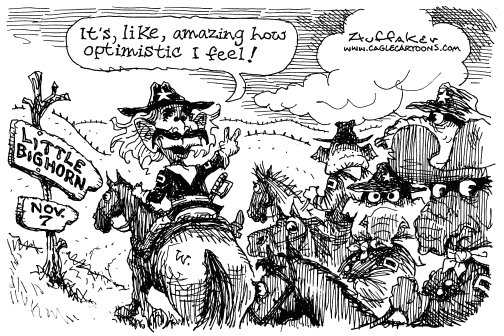 By Dick Morris & Eileen McGann November 02, 2006
According to the Zogby poll, Republican fortunes, while improving in early October, have fallen since. On Sept. 22, Democrats led in the generic vote poll (Do you plan to vote for the Democratic or the Republican candidate in your district?) by nine points, 42-33. But by Oct. 11, their margin was only three - 37-34. But by Oct. 24 it was back up to 11 points - 44-33 - enough for the Democrats to take control of the House and probably the Senate.  Sandy Huffaker, Cagle Cartoons Distributed to subscribers for publication by Cagle Cartoons, Inc.
Among independents, the percent that plan to vote Republican has risen from 15 percent on Sept. 22 to 23 percent on Oct. 11 to 26 percent on Oct. 24. While independents are still voting for more Democrats, it's only by 38-26 compared with 38-15 last month. But as the Republican Party has gained among Independents, it is losing its base. Republicans who plan to vote Republican in 2006 have dropped from 75 percent on Sept. 22 to 72 percent on Oct. 11 to 68 percent on Oct. 24! Obviously the impact of the Foley scandal has yet to diminish among the morality-minded Republican base. Historically, the Republican Party is able to attract much more support from its base than the Democrats have been able to do from theirs'. But now Democrats are more loyal than Republicans. On Sept. 22, Zogby had 82 percent of the Democrats voting Democrats and 75 percent of Republicans voting Republican. By Oct. 11, party loyalty on both sides had dropped and only 76 percent of Democrats voted their candidates and 72 percent of Republicans backed their party. But by Oct. 24, Democrats had come back to their party and 81 percent were voting for its candidates while only 68 percent of Republicans were loyal to their ticket. GOP problems with their base should be curable since Republicans largely agree with their party on all the major issues. Their disloyalty stems from the failure of the Republican Congress and President Bush to pass their agenda and concerns over financial and morality scandals in Washington. If talk-radio show hosts, cable news stations, and the White House do what they do best talk to their base they should be able to turn the situation around. But so far their efforts have been unavailing. But the Democrats have their problems too. Despite their huge national edge they are not leading in the key Senate races. For example, in New Jersey, Rasmussen's polls have the race between Republican challenger Tom Kean and Democratic Sen. Robert Menendez tied. But, in the same survey, New Jersey voters want Democratic Party control of the Senate by 54-36. So while the party is winning by 18 points, its candidate can manage no better than a tie! And despite the national trend toward the Democrats, Missouri Republican Sen. Jim Talent still clings to a 50-48 lead over Democrat Claire McCaskill. Likewise in Tennessee, Rasmussen has Republican Bob Corker leading Democrat Harold Ford by 50-48. To control the Senate, Democrats must win two of these three: New Jersey, Tennessee and Missouri and so far, they trail in two and are tied in the third. Why are Democrats trailing so far behind the national party trend? Because Republican negative ads are working so well and the GOP financial advantage is making itself felt in individual races. The Democrats, dragged down by their suicidal decision to install the fundraising challenged Howard Dean as national chairman, are simply finding it hard to compete on the airwaves in key states. Even Clinton crony Harold Ickes's much heralded effort to fund Democratic races has fallen far short of its fund raising goals, having raised only $3 million of the projected $10 million for which he had hoped. So voters in swing states are saying: "I want the Democrats to win, just not the guy running in my district." It is still too early to tell if the national Democratic trend will assert itself in the end or whether the Republicans can pull out the swing districts. But the key will be whether the GOP base itself genuinely wants a Republican Congress or not. E-mail: Dick Morris at dmredding@aol.com
|